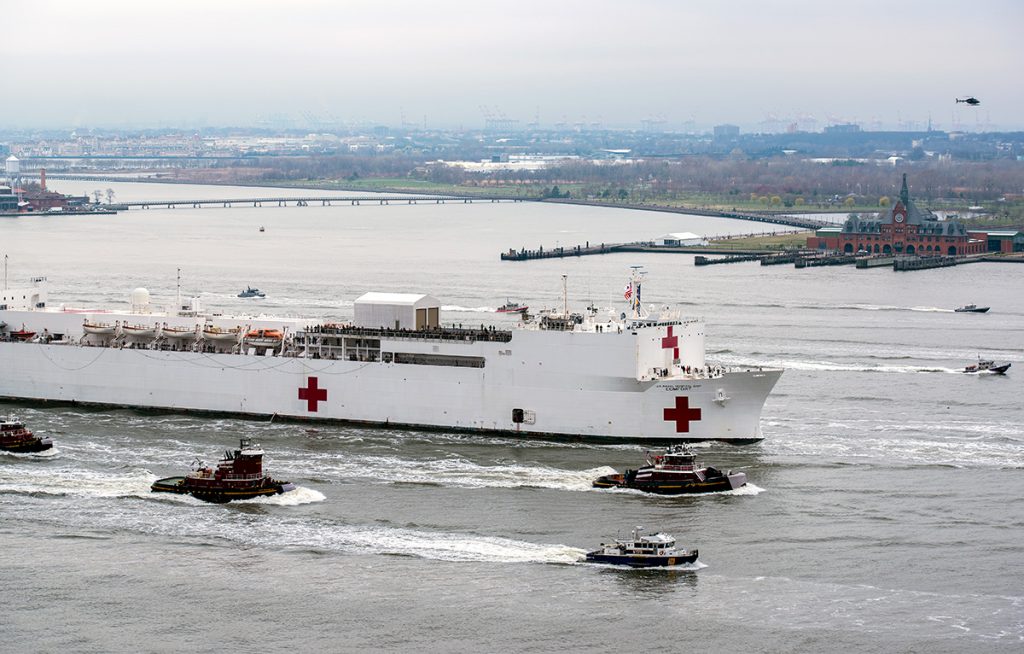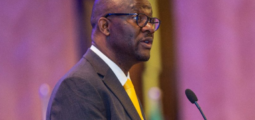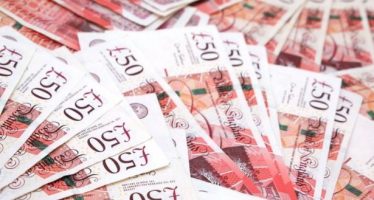Separating the Wheat from the Chaff

Manhattan, New York – March 30, 2020: USNS Comfort Hospital Ship enters Manhattan
Scale, speed, and simplicity. In order to have a discernible effect, measures taken to alleviate the impact of the corona pandemic on people, businesses, and institutions must include these three key elements.
Earlier this week, the US navy became the unlikely star in a possibly deadly tragedy of errors involving its hospital ship USNS Comfort. On the order of President Donald Trump, the vessel was dispatched with great fanfare from Norfolk, Virginia, to New York Harbor where throngs of onlookers ignored social distancing recommendations to watch the ship dock at Pier 90 of the Manhattan Cruise Terminal.
The idea behind the emergency deployment was to help ease the pressure on New York City hospitals by making the ship’s 1,000 beds and battle-hardened medical staff available to non-corona patients needing urgent care. However, the New York Times revealed that by Thursday evening, fully 72 hours after the USNS Comfort slipped into her berth, only about 20 patients had been transferred to the ship. The newspaper quoted Michael Dowling, head of the city’s largest hospital system Northwell Health, who bluntly called the high-profile exercise a ‘joke’.
A slew of military protocols and bureaucratic hurdles had prevented the admittance of patients to the ship. Whilst health professionals in the city worked around the clock, the medical staff of 1,200 aboard the USNS Comfort remained mostly idle. The scene was much the same in Los Angeles where the Comfort’s sistership, the USNS Mercy, also failed to provide solace due to tangled paperwork.
The US Navy this week struggled to keep its reputation afloat after it transpired that the commander of the aircraft carrier USS Theodore Roosevelt had been relieved of his duties for sounding the alarm over corona infections on the ship. Captain Brett Crozier had asked for permission to disembark and quarantine the vessel’s nearly 5,000 crew members on Guam, a US island in the Pacific, reminding his superiors in Washington that the country is not at war and ‘sailors do not need to die’. Though permission was eventually granted, Captain Crozier received his marching orders.
Though there may be many good reasons for the US Navy’s unfortunate failings in a war of a non-military nature, its institutional bumbling illustrates the need for scale, speed, and simplicity. How to properly apply these principles was shown by the UK government. After initially failing to recognise the almost unprecedented scope and impact of the corona pandemic, the cabinet has moved quickly to catch up with events and improve the effectiveness of its response.
This has largely been the work of Chancellor of the Exchequer Rishi Sunak who promptly and admiringly shed all ideological baggage to rally whatever might was left in the hollowed-out state to forcefully intervene and save the nation from an economic meltdown. Earlier this week, Chancellor Sunak proved up to the monumental task thrust upon him by circumstance and rapidly adjusted the terms of his £330 billion Corona Business Interruption Loan Scheme (CBILS). Mr Sunak was visibly upset after he noted that some commercial banks refused to ‘play their part’ and were offering affected small businesses regular loans at higher interest rates, and with more strings attached, instead of the cheaper and less cumbersome credit facilities made available through the government-backed scheme.
Yesterday, Mr Sunak banned banks from demanding personal guarantees on loans not exceeding £250,000. He also expanded the CBILS to include all small- and medium-sized businesses. Previously, the facility was only available to companies unable to access regular funding. Mr Sunak also said that the scheme may be expanded as dictated by the needs of the business community and promised to ensure the quick and hassle-free disbursement of credit. At betting emporium Ladbrokes, the stylish, dashing, smart, and energetic chancellor is already being tipped as a hot favourite to become the next occupant of Number 10. Crises do have a tendency to separate the wheat from the chaff – and expose political fluff for what it is.
Slow in coming, but quick to spread after it gains a foothold, the corona virus poses a threat that is almost impossible to overstate. Indices across the board paint a harrowing picture that inspires both fear and a measure of desperation. Quoted in The Guardian, Chief Eurozone Economist Claus Vistesen of Pantheon Macroeconomics is at a loss for words: “We are struggling to come up with words to describe the numbers which are now so far out of any reasonable range that they are difficult to interpret.”
The Eurozone composite purchasing managers’ index (PMI) compiled by IHS Markit plunged to an all-time low of 29.7 in the space of a single month. In February, on the eve of the pandemic, the index stood at 51.6, indicating a modest degree of confidence in economic prospects. On the PMI scale, 50 marks the difference between optimism and pessimism. In the US, almost 6.7 million people filed for unemployment benefits last week, the highest number by far ever recorded.
With the 3.3 million who had put in claims in the week before, the US economy lost a staggering 10 million jobs in a fortnight. Former Labor Department economist William Rodgers fears that unemployment has shot up from 3.5 percent in February to almost 17 percent now. The actual numbers for March will only be ready for release in early May due to the time lag between data gathering and processing. The employment data scheduled for publication today by the Bureau of Labor Statistics include only the first few days of the pandemic.
Economies the world over have now entered unchartered choppy waters and rely on the vagaries of dead reckoning to plot a course. It becomes clear that the speed and ferocity with which the recession hits have no parallel in modern history. Events that usually take a year or longer to unfold are compressed in days, catching everybody off guard.
Comparisons to wartime economies are unhelpful and fail to consider the sudden and near-total disappearance of demand. Countries readying for battle usually retool their economy to deliver the weapons of war, spurring supply to meet the demand for military hardware.
Battling the corona virus involves sizeable outlays of cash on the supply of medical equipment, research, and staff. That effort, however heroic, major, and necessary, is not enough to sustain entire economies. Absent strong consumer demand, other ways need to be found to keep production lines humming, albeit at a lower pitch, during and after the pandemic.
Once the virus has been contained, governments must find an equilibrium between the need to rebalance their now severely distorted national accounts and the need to return to growth. Without the latter, the former becomes a hopeless pursuit.
A failure to destroy the trillions of fiat money issued to offer a lifeline to the economy entails the risk of spurring inflation – the market’s implacable way of eroding the money supply when central banks are reluctant, or too slow, to act. However, removing those trillions – helpful now but toxic later – from the economy inevitably depresses demand, involves austerity, and lengthens the recession.
So far, both the Federal Reserve and the European Central Bank have been able to inject vast amounts of cash into the economy without being penalised. QE (quantitative easing) in its various guises has been a fixture of economic life since the financial crisis of 2008. All that time, inflation has remained dormant. When governments start to grapple with the long-term consequences of the corona pandemic, they will face a conundrum: opt for a long recessionary tail or risk awakening inflation from hibernation. This pandemic has no winners, few silver linings, and is not over when the virus has been defeated.
You may have an interest in also reading…
Money for Nothing
From a mere medium of exchange, money has turned into a pixie dust that, sprinkled liberally, brings economies to bloom
Click OK and Call Me in the Morning — How Online has Changed Shopping for Meds
Social media have been on about the New Normal since the start of the pandemic. People are still looking forward
Vietnam – No Stopping Country on the Ascendancy
After two decades of recording full employment and boisterous growth rates, Vietnam has taken a significant, though far from fatal,

















































































